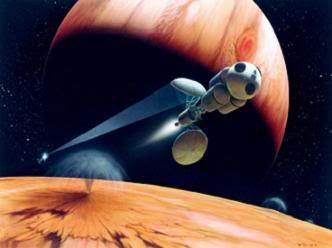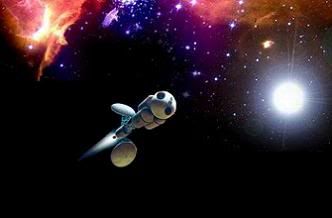Post by glactus on Dec 25, 2010 12:26:52 GMT
Before sending out astronauts on an interplanetary mission, we need to investigate how the conditions in space affect human health. The International Space Station is therefore, of huge importance to ensure the health of a spaceship crew travelling to other planets

The International Space Station
While exloration is an important survival strategy, the human species has added another reason for exploration, namely curiosity, the intellectual urge to explore the unknown, so the ultimate frontier for the twenty-first century is space.
Astronomical observations and satellites have already yielded
immense knowledge about our solar system and the universe beyond. But these technologies can provide only a limited picture of what is out there; and eventually humans themselves will have to travel to other planets to investigate them in more intimate detail.

Beyond Jupiter
For humans leaving Earth's orbit for extended periods, there are extreme dangers. One is the near absence of gravity in space; the presence of high-energy, ionizing cosmic ray (HZE) is another. Because both zero gravity and cosmic rays would have severe health implications for astronauts on a Mars-bound spaceship, we first need to investigate their effects on cells, tissues and our hormonal and immune systems.

Deep into the void
Although we are able to produce HZE nuclei on Earth and study their effects on biological material, we cannot simulate extended periods of low gravity and their additive effects on cells and tissues.
Thus, the International Space Station will have an enormously important role in assessing the health dangers for humans in space.

The pistol star
Credits:
Richard B. Setlow, a Senior Biophysicist at the Brookhaven
National Laboratory, Upton, New York.

The International Space Station
While exloration is an important survival strategy, the human species has added another reason for exploration, namely curiosity, the intellectual urge to explore the unknown, so the ultimate frontier for the twenty-first century is space.
Astronomical observations and satellites have already yielded
immense knowledge about our solar system and the universe beyond. But these technologies can provide only a limited picture of what is out there; and eventually humans themselves will have to travel to other planets to investigate them in more intimate detail.

Beyond Jupiter
For humans leaving Earth's orbit for extended periods, there are extreme dangers. One is the near absence of gravity in space; the presence of high-energy, ionizing cosmic ray (HZE) is another. Because both zero gravity and cosmic rays would have severe health implications for astronauts on a Mars-bound spaceship, we first need to investigate their effects on cells, tissues and our hormonal and immune systems.

Deep into the void
Although we are able to produce HZE nuclei on Earth and study their effects on biological material, we cannot simulate extended periods of low gravity and their additive effects on cells and tissues.
Thus, the International Space Station will have an enormously important role in assessing the health dangers for humans in space.

The pistol star
Credits:
Richard B. Setlow, a Senior Biophysicist at the Brookhaven
National Laboratory, Upton, New York.



